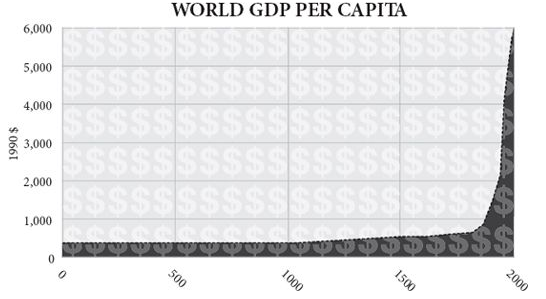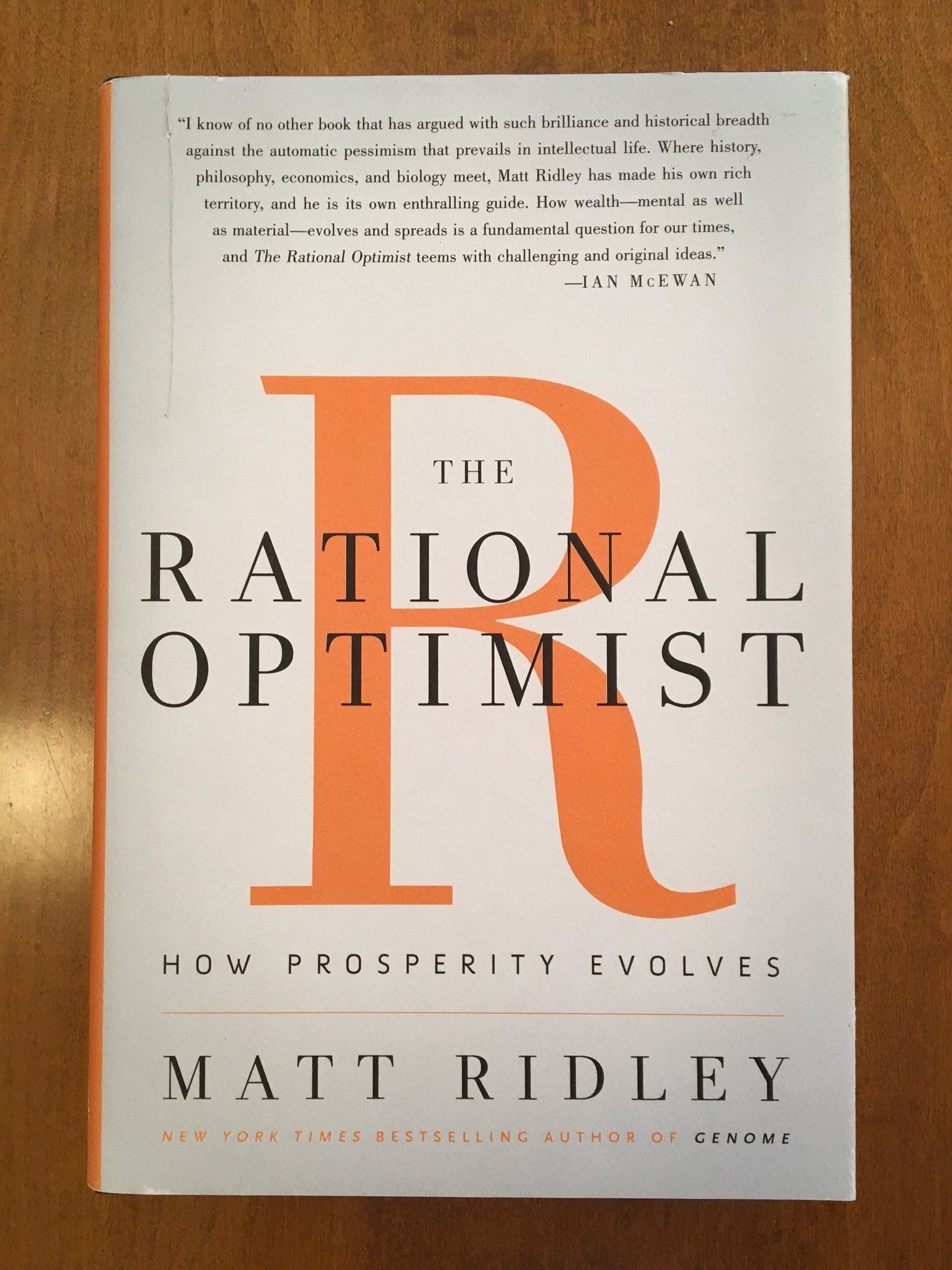Do We Have A Crisis In Perspective?
Since 1800, the population of the world has multiplied six times, yet average life expectancy has more than doubled and real income has risen more than nine times. Taking a shorter perspective, in 2005, compared with 1955, the average human being on Planet Earth earned nearly three times as much money (corrected for inflation), ate one-third more calories of food, buried one-third as many of her children and could expect to live one-third longer. She was less likely to die as a result of war, murder, childbirth, accidents, tornadoes, flooding, famine, whooping cough, tuberculosis, malaria, diphtheria, typhus, typhoid, measles, smallpox, scurvy or polio. She was less likely, at any given age, to get cancer, heart disease or stroke. She was more likely to be literate and to have finished school. She was more likely to own a telephone, a flush toilet, a refrigerator and a bicycle. All this during a half-century when the world population has more than doubled, so that far from being rationed by population pressure, the goods and services available to the people of the world have expanded. It is, by any standard, an astonishing human achievement.
Matt Ridley, The Rational Optimist: How Prosperity Evolves (Harper-Collins, 2010), 14.
It is by any standard, and any reasonable standard, and any remotely intelligible standard, an astonishing human achievement. But I think that Matt Ridley--rationally optimistic as he may be--is underselling this achievement.
I'm here to sell it. A quick look at the caliber of public discourse around the topics Ridley addresses like wealth, poverty, child mortality, and so on paints a picture radically different than "The Rational Optimist". But the case made by pessimists is never quite wrong, just grossly warped and misleading. The world is extraordinarily better off than we are led to believe. We're undergoing a crisis in perspective.
Here's an analogy (hopefully a helpful one) to illustrate the cognitive dissonance: if the world was an organism, then experts bent on pessimism use data for what is happening at the microscopic -cellular level without any reference or acknowledgement of what's going on at the macroscopic -tissue level. Micro vs. macro and cellular vs. tissue. I.e. the information we get from "the media" sees the world through a microscope!
The media machine uses a 1000X lens that zooms our perspective in. The image is sharp but from that magnification it also looks dire. From 1000X, cells are ruthlessly attacking each other, fighting bacteria, viruses wreaking havoc, and health looks to be a naive utopianism.
Look at this;

ENTER: Matt Ridley.
What Ridley did with "The Rational Optimist" was to lean back from the microscope where the media is huddled--fighting amongst themselves for a better view of the cellular mayhem taking place on the little glass slide--and looked at the tissue directly! With the naked eye!
To his great surprise the organism as a whole, from the tissue-perspective, was looking healthier than ever, even growing stronger! In this analogy that organism is our human-sociological reality.
Now this isn't to say that billions of people aren't struggling to survive in 2018. Make no mistake, they are. What I do want to make visible is our extreme incapacity in understanding proportionality. If we choose to live with microscopes perpetually duct-taped over our eyes, we will continue to be dismayed into inaction by the depressing state of the world. But* if we can rip off the tape, look at the world fresh and at the appropriate scale, it suddenly appears capable of improvement! If we look at the tissue directly like Mr. Ridley, then helping the most impoverished in society looks, for the first time, seriously doable.
The rich have got richer, but the poor have done even better. The poor in the developing world grew their consumption twice as fast as the world as a whole between 1980 and 2000. The Chinese are ten times as rich, one-third as fecund and twenty-eight years longer-lived than they were fifty years ago. Even Nigerians are twice as rich, 25 per cent less fecund and nine years longer-lived than they were in 1955. Despite a doubling of the world population, even the raw number of people living in absolute poverty (defined as less than a 1985 dollar a day) has fallen since the 1950s. The percentage living in such absolute poverty has dropped by more than half – to less than 18 per cent.
Matt Ridley, The Rational Optimist: How Prosperity Evolves (Harper-Collins, 2010), 15.
One of the biggest problems I believe we have in the world today is a crisis in perspective. After reading Ridley, my intuition is that we should try to zoom out and get a picture of the world in its totality--with the broadest lens--before addressing the problems we find under the microscope. Context is crucial here, because the very problems defined at the micro scale are dependent on the state of the system at its macro scale.
In a sense, to use a popular scientific adage, the media is not even wrong. They're committing a fallacy that is somewhat akin to a category mistake. You might call it a "scaling or magnification mistake". It's not that the problems focused on by the media are wrong in their details, they're wrong in qualifying as the right sorts of problems generally!
Given we trust the intentions of said journalists to be attempting to improve society by calling attention to matters of "importance", and I find no reason to attribute malice where incompetence is equally plausible, then we find ourselves in a serious case of the road to hell being paved with good intentions.
The crisis in perspective neuters our opportunity to discover exactly what the heck is contributing to these explosions in prosperity... so-that-we-can-fuel those endeavors and start solving real problems. I should mention that in "The Rational Optimist" Ridley goes on to defend a theory which accounts for these explosions in prosperity. I will save that topic for a subsequent post.
Lastly, it's been exciting to see a new coalition of intellectuals making the case for a more rationally optimistic perspective. They've been informally dubbed "The New Optimists", an allusion to the recent "New Atheist" phenomenon. Whereas the New Atheists unapologetically argued for a Godless metaphysics, the New Optimists are arguing for a recognition of the blunt progress made by humanity in recent history. While there are plenty of micro, local, and pointed issues that must be dealt with, exclusively looking through the microscope can be a depressing practice. Ridley's perspective is a brighter one--and to my estimation--a truer one.
You might also like my post How Mainstream Media Hacks Our Perception
The New Optimists:
- "The Better Angels of Our Nature: Why Violence Has Declined"
- "Enlightenment Now: The Case for Reason, Science, Humanism, and Progress"


Your Post Has Been Featured on @Resteemable!
Feature any Steemit post using resteemit.com!
How It Works:
1. Take Any Steemit URL
2. Erase
https://3. Type
reGet Featured Instantly � Featured Posts are voted every 2.4hrs
Join the Curation Team Here | Vote Resteemable for Witness
Congratulations @distillationsbl! You have completed some achievement on Steemit and have been rewarded with new badge(s) :
Click on any badge to view your own Board of Honor on SteemitBoard.
For more information about SteemitBoard, click here
If you no longer want to receive notifications, reply to this comment with the word
STOP